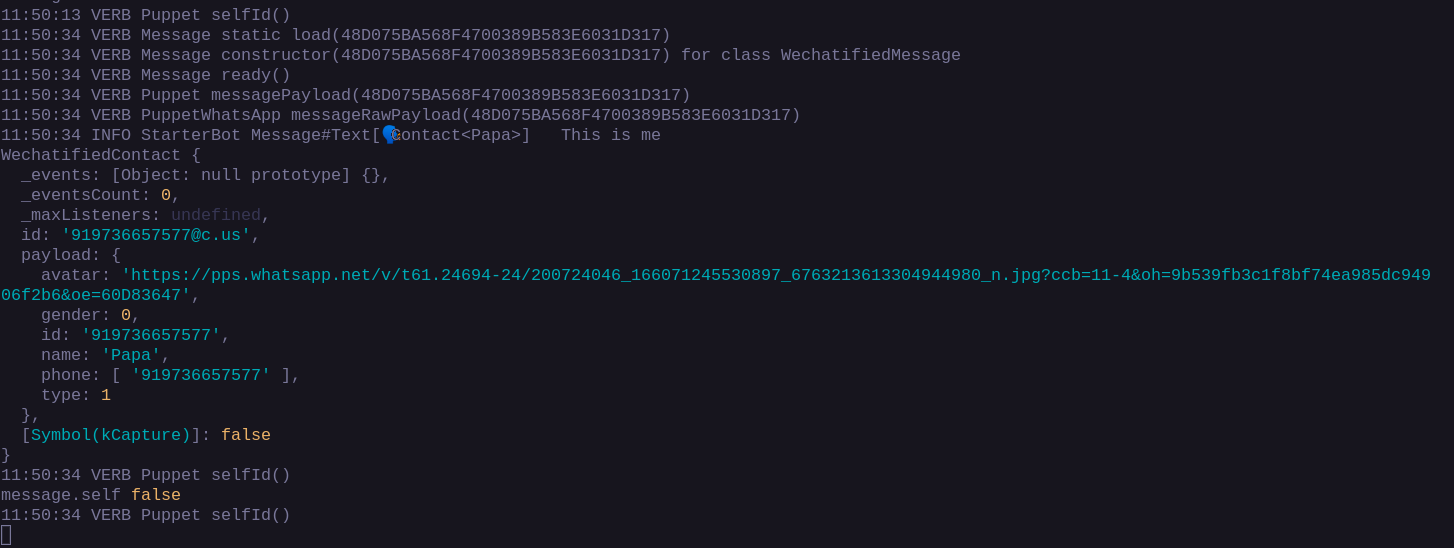Dealing with message
Messages
Automation of messages can be done easily with wechaty onMessage function. This guide will give you a step by step overview of how to respond to self messages or messages in a room.
Prerequisites
- Your system must have Node.js installed (version >= 16).
- Your system must have Wechaty (version >= 0.40).
- You need to be familiar with the basics of Wechaty platform. If not, follow our tutorials section.
- You need to have at least a minimal application ready to work, follow one of our Example/Ding-dong-bot.
If you don't know where to start from
See Running our first ding-dong bot.
There are various message type such as MessageType.Text, MessageType.Image, MessageType.Video, MessageType.Url, MessageType.Emotions, MessageType.Attachment. Some of the function are mentioned below and require a basic script that can help run the bot. The basic script starts by importing the code from Github/Ding-dong-bot.Integrate the below code, for this action to work.
Mention
Use this Mention feature to send a (@ mention) to others in the room.This function works if the message received by the onMessage function belongs to a room.
- TypeScript
- JavaScript
- Python
- Go
- Java
- PHP
- Scala
- C#
- Rust
import { Message } from 'wechaty'
async function onMessage(message: Message): Promise<void> {
if (await message.mentionSelf()) {
const room = message.room()
if (!room) {
throw new Error('Should never reach here: a mention message must in a room')
}
console.info(message.text())
// "@bot Hello"
console.info(await message.mentionList())
// [bot]
console.info(await message.mentionText())
// "Hello"
const talker = room.talker()
await room.say`Thanks for mention me! ${talker}`
}
}
bot.on('message', onMessage)
import { Message } from 'wechaty'
async function onMessage(message) {
if (await message.mentionSelf()) {
const room = message.room()
if (!room) {
throw new Error('Should never reach here: a mention message must in a room')
}
console.info(message.text())
// "@bot Hello"
console.info(await message.mentionList())
// [bot]
console.info(await message.mentionText())
// "Hello"
const talker = room.talker()
await room.say`Thanks for mentioning me! ${talker}`
}
}
bot.on('message', onMessage)
from typing import List
from wechaty import Wechaty, Contact
class MyBot(Wechaty):
async def on_ready(self, _):
contacts: List[Contact] = await self.Contact.find_all()
for contact in contacts:
print(f'id<{contact.contact_id}>, name<{contact.name}>, type<{contact.type()}>')
// TODO: Pull Request is welcome!
// TODO: Pull Request is welcome!
// TODO: Pull Request is welcome!
// TODO: Pull Request is welcome!
// TODO: Pull Request is welcome!
// TODO: Pull Request is welcome!
The expected output of the JavaScript code is:

Self message
Use this Self message feature to reply to the bot.This function works if the message received by the onMessage function has been sent by the bot to itself.
- TypeScript
- JavaScript
- Python
- Go
- Java
- PHP
- Scala
- C#
- Rust
import { Message } from 'wechaty'
async function onMessage(message: Message): Promise<void> {
if (message.self()) {
const talker = message.talker()
const bot = message.wechaty.userSelf()
assert(talker === bot, 'Message is sent from bot')
console.info('Message is sent from bot')
}
}
bot.on('message', onMessage)
import { Message } from 'wechaty'
async function onMessage (msg) {
log.info('StarterBot', msg.toString())
const contact = msg.talker()
console.log(contact);
console.log("message self",msg.self());
if (msg.self()) {
const b = msg.wechaty.userSelf()
assert(talker === b, 'Message is sent from bot')
console.info('Message is sent from bot')
}
bot.on('message', onMessage)
from typing import List, Optional
from wechaty import Wechaty, Contact
from wechaty_puppet.schemas.contact import ContactQueryFilter
class MyBot(Wechaty):
async def on_ready(self, _):
# find by id
filehelper: Optional[Contact] = await self.Contact.find('filehelper')
if filehelper:
print(f'filehelper<{filehelper}>')
# find by name
contacts: List[Contact] = await self.Contact.find_all(ContactQueryFilter(name='your-friend-name'))
print(f'total number of contacts: {len(contacts)}')
for contact in contacts:
print(contact)
// TODO: Pull Request is welcome!
// TODO: Pull Request is welcome!
// TODO: Pull Request is welcome!
// TODO: Pull Request is welcome!
// TODO: Pull Request is welcome!
// TODO: Pull Request is welcome!
The expected output of the JavaScript code is:
